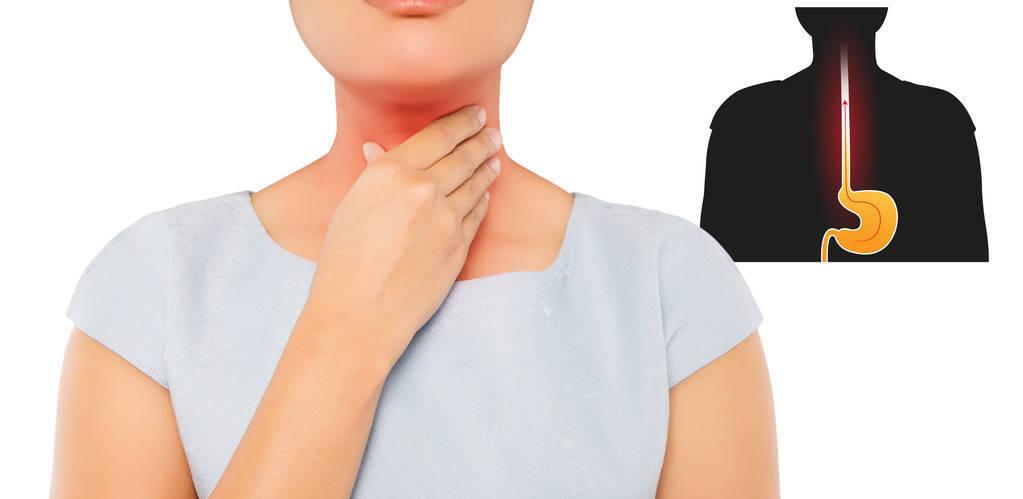Whenever the sour digest is regurgitated from the stomach back to the esophagus or mouth, the taste is really uncomfortable...
Many times, we often take "acid reflux" as a physiological phenomenon, but gastric acid reflux may actually be caused by a disease, which is often said to be gastroesophageal reflux disease.

<h1 class="pgc-h-arrow-right" data-track="7" > what disease is this? </h1>
Gastroesophageal reflux disease (GERD) is a relatively common stomach disorder that many people are deeply affected by. The disease refers to the long-term regurgitation of gastric contents into the esophagus, which can cause a variety of symptoms, such as the common heartburn and acid reflux.
The details are as follows:
(1) Heartburn: The burning sensation behind the sternum often appears about an hour after a meal.
(2) Acid reflux: Feel a stream of heat rushing from the bottom up to the middle of the chest, and there is a burning sensation and a tingling sensation.
Therefore, if heartburn symptoms occur frequently and persistently, it is possible that gastroesophageal reflux disease is possible. Some patients also have chest pain, difficulty swallowing, or non-gastrointestinal symptoms such as cough, pharyngeal discomfort, chest tightness and panic, and often cannot see the problem in cardiovascular medicine until gastroenterological reflux disease is diagnosed.
<h1 class="pgc-h-arrow-right" Data-track="56" why is this happening >? </h1>
Under normal circumstances, the swallowed food goes down the throat and through the esophagus into the stomach. The muscle valves of the lower esophageal sphincter (LES) open so that food can enter the stomach, or allow gas to drain from the stomach and then close again. The stomach then releases strong acids to help break down food.
If the lower sphincter of the lower esophagus opens too often or does not close tightly enough, stomach acid will regurgitate or leak into the esophagus, causing damage to it, causing heartburn.
Therefore, when the subesophageal sphincter is relaxed for some reason, accompanied or not accompanied by overeating, gastric emptying to delay pregnancy, ascites, weight-bearing labor, etc., it will cause the appearance of reflux symptoms. In addition, abnormal esophageal peristalsis and saliva secretion, as well as damage to the mucous membranes of the digestive tract, can also lead to gastroesophageal reflux disease.
<h1 class="pgc-h-arrow-right" data-track="57" how to treat > scientifically? </h1>
The treatment of gastroesophageal reflux disease requires an understanding of its severity, and the severity of GERD depends on the degree of dysfunction of the lower esophageal sphincter, as well as the type and extent of fluid reflux from the stomach.
The goal of treatment is to reduce the reflux or to reduce the likelihood of damage caused by reflux to the inner surface of the esophagus. If gastroesophageal reflux disease is confirmed, drug therapy is commonly used in the clinic.
drug therapy:
(1) The preferred drug is an acid suppressor, which plays a therapeutic role by inhibiting gastric acid secretion and reducing the acidity of gastric contents, and is commonly used for omeprazole, rabeprazole and other pazolium drugs;
(2) For some patients with severe night-time attacks, H2 receptor antagonists can also be selected, such as ranitidine, famotidine and other titerine drugs;
(3) pro-gastrointestinal motility drugs, such as cisapride;
(4) Gastric mucosal protective agents, such as aluminum phosphate, aluminum magnesium carbonate, etc., by improving the peristalsis function of the esophagus, promoting gastric emptying, and protecting the damaged esophageal mucosa;
(5) Some patients need to add anti-anxiety and antidepressant drugs, and psychological treatment when necessary.
In summary of drug treatment methods, specific drug selection, joint types, and courses, doctors emphasize individualized treatment, so it must be carried out under the guidance of professional gastroenterologists, and drugs should not be used indiscriminately to avoid frequent occurrence of symptoms.
In addition, surgery or endoscopic treatment may be required for patients who are intolerant or ineffective in drug therapy, or who have serious complications or even suspect the possibility of becoming cancerous.
In addition, for gastroesophageal reflux disease, doctors will also recommend lifestyle changes and dietary changes to alleviate the symptoms of acid reflux and reduce the frequency of attacks.
Adjuvant therapy for lifestyle modification:
(1) Observe the condition and review
Pay attention to the symptoms of your own condition, understand whether there are new symptoms, if you can seek medical treatment in time, follow the doctor's instructions, and review regularly according to the doctor's instructions to avoid aggravation or recurrence.
(2) Pay attention to the adjustment of diet
Eat less and eat more, avoid overeating, and skip foods that may worsen symptoms or trigger a seizure, such as high-fat foods, fried foods, spicy foods, chocolate, mint, garlic, onions, citrus fruit drinks, tomatoes, caffeinated drinks, and carbonated drinks.
(3) Avoid eating before going to bed
Gastroesophageal reflux disease lying down immediately after a meal increases the risk of seizures, therefore, patients should not eat 2-3 hours before bedtime.
(4) Psychological counseling when necessary
The treatment cycle of gastroesophageal reflux disease is long, requiring long-term cooperation of patients, patients may have long-term anxiety, fear and other psychological problems, and long-term anxiety, depression, the treatment of the disease will also have an impact, therefore, when necessary, patients need psychological counseling.
(5) Exercise appropriately every day
In terms of exercise choices, including walking, doing health exercises, playing tai chi, jogging, etc., each exercise is greater than 30 minutes, and exercise 3-5 times a week is appropriate to avoid causing physical discomfort.
(6) Other healthy life adjustments
Maintaining a healthy weight is important, and obesity can put pressure on the stomach and can induce attacks of the disease. Quit smoking and alcohol. Do not wear tights. The head of the bed is raised 15 cm. Do not eat for 3 hours before bedtime, etc.
#Gastrointestinal Health ##Autumn Health Does Not Close ##胃食管反流病 #
Resources:
[1] Zhu Baoyu, Song Defeng, Shi Chunyu, et al. Research progress on the pathogenesis of gastroesophageal reflux disease. Chinese Journal of Experimental Diagnostics, 2015, 000(002):344-346.
[2] Chen Jianhai, Zhong Jie, Kong Guimei, et al. Progress in the treatment of gastroesophageal reflux disease. China Journal of Endoscopy, 2015, 21(10):1090-1094.